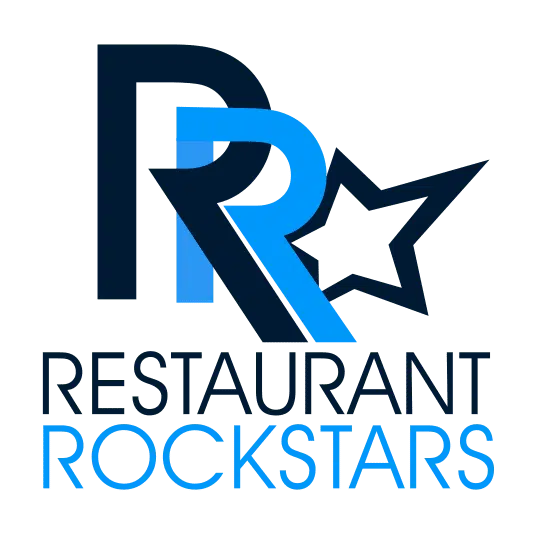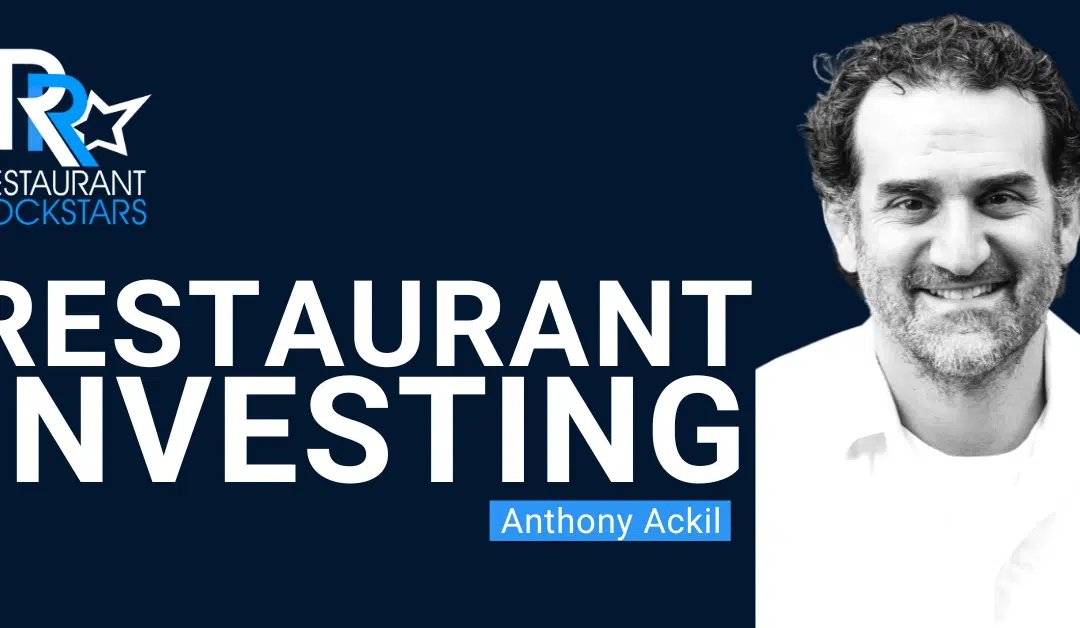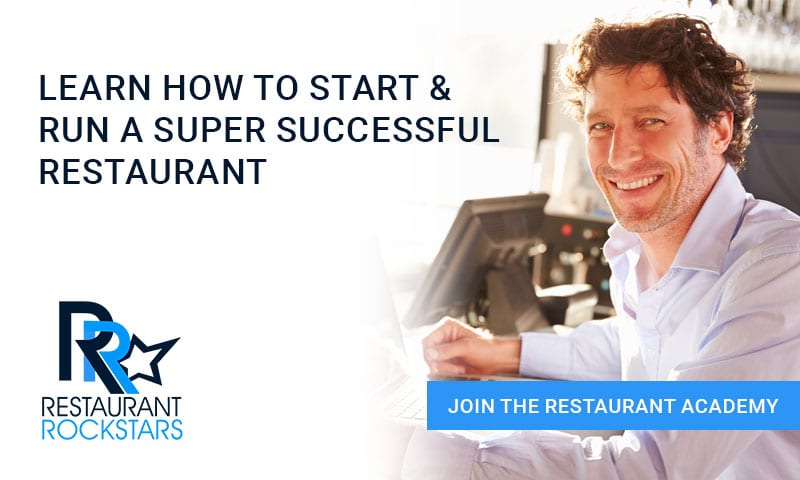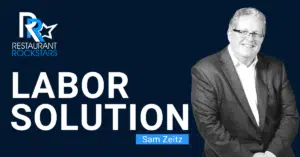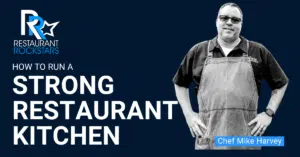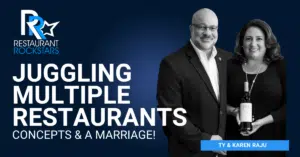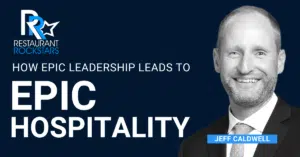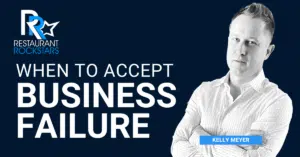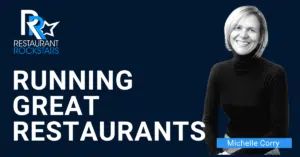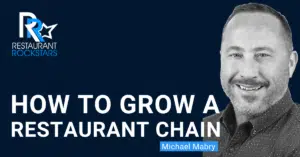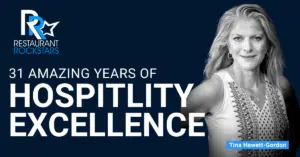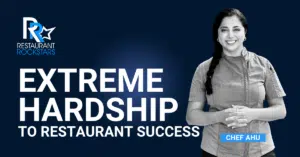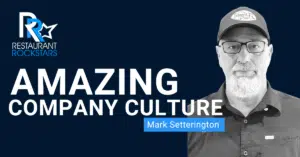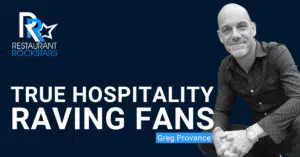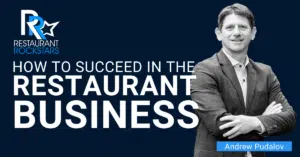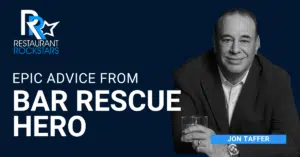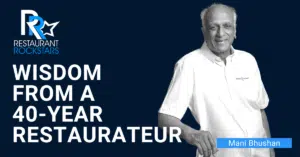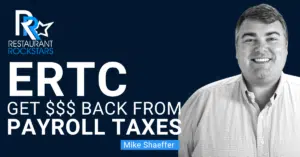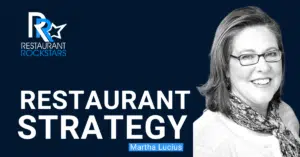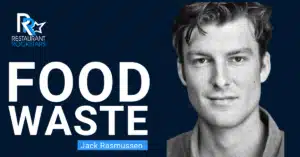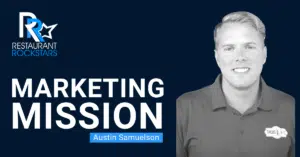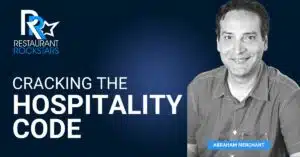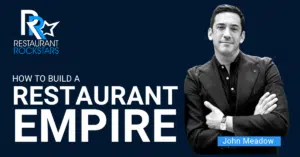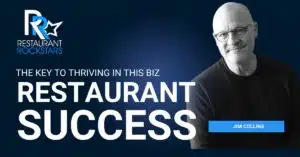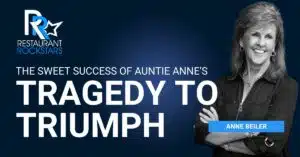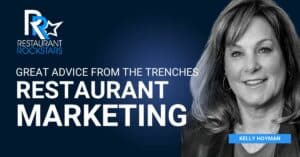Restaurant Rockstars Episode #304
What To Know About Investing in Restaurants!
LISTEN HERE OR ON YOUR FAVORITE PODCAST PLAYER
Prefer to watch the interview?
Click the video below.
Pride and passion run deep in the restaurant business no matter the size of the organization.
Some may be fulfilled running a single independent restaurant while others aim to grow their concepts to multiple locations.
In this episode of the Restaurant Rockstars Podcast, I speak with restaurant investor Anthony Ackil. He co-founded and grew a 70+ unit restaurant chain, then exited to become the Founder of www.streetlightventures.com
No matter your restaurant plan and strategy, stay tuned to learn how to: run a great restaurant, grow one concept from one to many and maybe even get inspired to discover new opportunities.
We’ll be discussing:
- Anthony’s story of growing his successful chain and investing in other successful hospitality operations
- What critical foundation makes one great restaurant able to become an even more successful chain or franchise
- The secret to “consistency” and fostering raving fans for your operation
- Staying relevant and the need to keep innovating
- Restaurant systems necessary to facilitate growth
- How effective training raises morale and elevates company culture
And importantly, what investors look for in a growing restaurant operation.
Watch or Listen on and then go Rock YOUR Restaurant!
Roger
Connect with Anthony:
https://www.facebook.com/MargsMexican
https://www.instagram.com/margsmex/
https://www.streetlightventures.com
https://www.instagram.com/streetlightventures
https://www.facebook.com/streetlightventures
Unknown Speaker 0:00
If your business is losing money, and it’s never made money, and you’re not, you’re not changing and pivoting, you make a mistake. You know, like, this business is all about changing and pivoting, you can’t have the ego thinking like you’re right in the customers wrong. If the customer is telling you, this isn’t working, nobody’s excited about it, sales aren’t going up profits going way down. You got to change, you got to make a pivot. And I believe that the one strength I have is I don’t have an ego, and I pivot 1000 times until I get it right.
Roger Beaudoin 0:33
Thanks for joining me back on the podcast. Today’s episode is all about restaurant investment. My guest is the founder of a investment company in the hospitality space. And he’s also a former co founder of a successful 70 unit chain. So he knows a thing or two about growing a big restaurant business. We’re going to talk all about critical operating systems, as well as technology and what they look for in potential restaurant investments. It’s a big episode. Stay tuned. But before you do, if you haven’t already, head on over to restaurant rockstars.com forward slash profits. I’m giving away three ways you’re killing your restaurant profits, thought provoking, immediately actionable information that may help transform your bottom line. Now on with the episode.
Intro/Exit 1:20
You’re tuned in to the restaurant rockstars podcast powerful ideas to rock your restaurant. Here’s your host Roger Beaudoin.
Roger Beaudoin 1:34
Listen, I am a huge believer that service is your restaurants greatest competitive advantage. But we all know that service takes time and commitment, dedication. Well, what if there was a training tool, a single tool that was completely customized to your restaurant brand, your menu. Let’s start with photos of the plate presentations, ingredients, romance, notes, allergens, everything that’s important that your staff need to know to present and bring to life your menus for your guests. That includes your wine and beer list. specialty cocktails, everything at their fingertips. Imagine in the back of house that cooks your new prep cooks or anyone can instantly look at the photos is a list of ingredients with prep times and cooking steps all the important things to produce each dish to perfection. Imagine there’s also table layouts of every dining space in your restaurant with table numbers and even seat numbers because we all know how important it is to deliver the right dish to the right guest This is a tool designed to enhance hospitality in your restaurant, not replace it. Learn more at surf now.com That’s srvnow.com Check it out.
Roger Beaudoin 2:42
You know paying bills is one time consuming restaurant detail in 1000 other details. With plate IQ your accounts payable is handled accurately and automatically. Plate IQ works with 30,000 restaurants of all types eliminating manual data entry in your accounts payable process. Technology takes care of line item General Ledger coding to invoice payment through plate IQs vendor pay network. Now no more paper checks. Your restaurant can seamlessly flow from invoice, upload to payment, and even earn cash back from paying over 180,000 vendors in the network on time. Played IQ is your paperless digital filing cabinet that frees your workspace from invoices, receipts and statements. You can search anytime by date, item or vendor. See when everything is due in manage schedules, approvals, payments, and filing right from your mobile pay digitally by cheque ACH or your plate IQ card. Best of all, no money leaves your account until it’s received by your vendor, which improves your cash flow and cuts confusion. It’s time to check out plate IQ at plate iq.com
Roger Beaudoin 3:55
Welcome back everyone this is the restaurant rockstars podcast with me today Mr. Anthony Ackil. He is the co-founder of seven unit chain be good. A restaurant investor and founder of street light ventures. Welcome to the show. Anthony How are you man?
Unknown Speaker 4:09
Hey, Rog, how you doing?
Roger Beaudoin 4:10
Great. Glad to have you got to have you back on the show here. So Anthony, where did it all begin for you? Because hospitality runs deep? Obviously. And it all started somewhere. I’d love to hear your story. Yeah, for
Unknown Speaker 4:21
me. i It’s funny, maybe a little different. I never worked in restaurants before never, you know, ran a business before but I always wanted to be an entrepreneur. And when I was probably 27-26 I decided I decided that you know it was time to do that. I’ve been working in an office for years after college really didn’t enjoy it like hated the idea of having a boss and me and my best friends. We my best friend. We were out in a bar one night and we’re like, you know, we don’t have kids. We don’t have any didn’t have wives at that point had no debt. It saved up all our money and we were like if we’re going to do industry got to do it now. We wrote down 50 ideas chose 10, dug into the 10 got, you know, chose ultimately chose the top one which was healthy fast food. And we started be good a year after that. So I quit my job literally the next day after that meeting. And it took us a year to get the first restaurant open. And it was crazy. I mean, like I said, we had no experience never worked in the restaurant industry before we worked so hard. I was working 20 hours a day, seven days a week and killing myself for that business, we will get to work. And, you know, I learned a lot around along the way, I think, because I had no experience. They had to learn everything, which I think is actually a pretty good. It’s a good thing. Because I learned from the ground up, I asked a lot of questions. And we sort of we thought, or at least we thought everything was new to us. So at some level, we had to rethink everything.
Roger Beaudoin 5:54
Yeah, sounds like a school of hard knocks kind of learning curve getting into it. Would you say you’re at the right place at the right time? Was the concept rock solid? Like, how did you make this work when you had so much to learn? And it’s like you really had no restaurant experience. And one of the most challenging businesses? I know, I think we
Unknown Speaker 6:11
were ahead of our time. So like we we were doing stuff before anybody else like we were doing kale and quinoa bowls before anybody were doing green smoothies before anybody? I think a lot of what we did, we were like, first to the game, which has its benefits, but also it’s tough. I mean, you don’t you sort of blaze your own path. It’s always you can’t learn from others mistakes. I do think we were first in many ways, which allowed us to be very different. But you know, I think that also caused some issues with the brand concept and operations. So
Roger Beaudoin 6:47
did it take a while for the concept to take off in that first location? Or did you have pretty steady business right from the get go? And then that was a foundation you built on? Tell us about, you know, that early the early stages of starting that business? And then the growth pattern after that would be really interesting.
Unknown Speaker 7:02
Yeah, I think it was tough at the beginning. We, you know, I think what’s a normal thought is you try as much as you can to get sales up. So at the beginning, we sold steak dinners, we sold hummus and pita chips, and so on fish in, like we, you know, over time whittled that down to a concept. I think where we started was just healthy food. I think it was too broad to you know, a little bit place. I think we learned from that to keep things tight and focused and get operations, right. But it wasn’t in a success out of the gate. I mean, it took, you know, a ton of work and a ton of pushing and always pivoting and always changing. I think that that was our strength is like we never settled, and we never gave up. And we just kept pivoting until we found something that worked.
Roger Beaudoin 7:54
Did you guys stay in your lane? or was there some overlap between what you did in the business? Like what were what was your primary role versus your friend and partners role? It’s like, did you have any overlap? Or do you do different things that you focused on that were important?
Unknown Speaker 8:08
Yeah, I think from the beginning, we divided up the business. So I would say after a week, we realized like, we’re going to actually be successful. We’re both entrepreneurs, we needed to say, This is mine, this is yours. I think that was one of the best things we ever did. I remember the conversation and we were hanging out and we’re like, this isn’t working like we’re fighting and arguing. And we’re too close to do that. We never had ego. So ego was never part of the equation, which I think sort of was the recipe for success for us. But John took over branded marketing, I took over operations and finance. And we, you know, he had his side of the business, he made decisions, I gave input. I had my side of the business, he gave input, but we really separated, you know, almost from the beginning.
Roger Beaudoin 8:55
And then when growth started to happen, what was that trajectory? Because you go from one restaurant to two or you go from one to five, it’s like what happened in your case?
Unknown Speaker 9:04
Yeah, so we went from one to two took us about 18 months. Yeah, two to four took us another, I would say year after that. Four to six and other years, we were growing pretty slowly. I remember we had excuse me, we had 12 restaurants. And we you know we were doing okay, like sales were they were okay, but not great. We were averaging like a million a restaurant, not not high enough to be able to really sell the business or, you know, attract private equity. And we we pivoted again, like we kept pivoting, but I remember this conversation with John and I said, Look, we’re gonna give this one more big chance, big push, try one more thing. And if it doesn’t work, we got to think of something else because we weren’t making enough money to support the lifestyles we wanted. And it just was sort of floating, not doing great. So we first introduced this killing King level, which is As soon as we put that on the menu, sales went up 30% Like, and I’m not talking over a year, I’m talking literally that day, scaling can wobble on the menu and sales went up 30%. So all of a sudden, we went from averaging a million to averaging like 1.4. In everything changed, like, you know, that literally that one decision, changed the business. So we raised money we had, we had, like I said, 12, restaurants, we had not really raised much money, we were mostly friends and family, if anything, and then all of a sudden, you know, we were getting all these term sheets from these private equity firms, and everybody got excited. And everything changed. You know, like, literally, within six months, everything changed. And we took on a first tranche of money, professional money, like like a 12, restaurants took on $6 million. And then we raised after that, raising 12 rounds of capital over the next probably five years. And what we did is we set up a situation where our investors could sell so those initial investors and really any investors after that, they were able to sell equity as we grew. So every round investors could sell and investors goodbye, we created like a little market that really gave liquidity every six months, which that’s a big deal for small restaurant financing. And that was I think one of the best things we did was good liquidity like that. Yeah. But once we raise that big round of capital, we wrote, we started ramping up. The most restaurants we ever opened in a year, I think was 28. And that was a big deal for us. And yeah, pretty crazy. I think we actually grew too quickly. To be honest, I think, you know, when you take on that type of money, when you take on that level of private equity firm, I would say that they pushed us to grow in ways that probably shouldn’t grow.
Roger Beaudoin 11:50
So brand building was obviously part of this too, because you you are creating a brand and as you grow, then visibility and awareness grows with it. Were all the locations I know the first store was in Boston, or was it Metro Boston?
Unknown Speaker 12:03
Yeah, first of all, was Back Bay 131 Dartmouth Street. I think one of the I would say mistakes we made is grew to sporadically. Like we had restaurants and probably 25 restaurants in Boston, and then 10 restaurants in, you know, five restaurants in Jersey, five restaurants in North Carolina, a restaurant, like it was just too spread out. Yeah, I think that was a mistake. Just operationally, I think it’s hard to grow. Almost contiguously like that. I think it’s better to have pubs of strength throughout them. That was a mistake we made. But yeah.
Roger Beaudoin 12:39
And there had to be some kind of reporting model among management among all these different stores and benchmarks and sort of sales, quotas and comparisons and you know, benchmarks. Exactly. Could you tell us a little bit about that? Were you involved in that? Because you were the finance guy,
Unknown Speaker 12:53
whole thing. So you know, we I sort of taught myself restaurant finance over the past 25 years, but from budgeting to reporting to keep an eye out, you know, setting bonuses based on performance. I think we did a good job. I think we learned a ton. I think where we started was very, you know, Mom and Pop where we ended was actually really professionalized where we had detailed bottom up budgets, we held people accountable. We had very detailed bonus structures. I think over time, we did a good job with that.
Roger Beaudoin 13:23
Yeah, awesome. Now, how long were you involved in it? And it at some point became a franchise as well.
Unknown Speaker 13:29
Yeah, we started franchising probably 10 years since seven years into it, but I use it, I started the business and I owe it to about 75 restaurants and then I, I left be good and sold my shares. Three and a half years ago.
Roger Beaudoin 13:44
Okay. Oh, wow, that was a good run. Excellent. Yeah. So you learned so much, obviously, like you said, you were raising capital, and you are obviously growing pretty rapidly. And we heard about the challenges and the pitfalls of that. But the learning that you experienced during that time, was sort of, would you say it was ideal to transition into restaurant investing?
Unknown Speaker 14:06
Yeah, I think so. I think, you know, what I learned? I think I learned what a good business is, I think I learned when where issues come from, in I think, you know, I learned what matters to me in the restaurant business. And I learned everything from like the ground up. So like restaurant finance, restaurant marketing, you know, development, build outs, you know, managing people setting up systems, I think we like because the way that we started this, we had to know everything. Like we didn’t have any help, like it created a good base for me to be able to do what I’m doing now.
Roger Beaudoin 14:39
For sure. Now, there’s quite a bit of our audience that are independent operators that are trying to grow their location, maybe they are a single independent, maybe they have three to five, maybe they have goals of franchising someday, and there’s so much of a magic formula to that and you mentioned a lot of them, but obviously, you know, selecting great staff and being able to trust them People you put in place, but also, like you said, locations are so important to how do you how did you select different locations when you have so many stores and you know, you want that perfect balance between not having them too close together, like just all the Metro Boston stores, but yet the visibility and the awareness that you’re getting a consistent experience, that sort of thing. Tell us about how you choose locations, based on available references based on
Unknown Speaker 15:28
what everything was gut instinct. Yeah, I love that. You know, when you get on in the area you’re in, like, I knew Boston really well, I grew up there. I knew like Metro Boston pretty well. But when you get into like North Carolina, DC, you know, New York, I didn’t know any of those areas. So I had to, you know, we had to start looking at data demographics, really figured out who our customer was, and then mapping where that customer is. And in the different areas, we were looking, we set up a full growth plan, growth strategy, we set our our ideal demographics, we mapped out areas, we’d set up what we call fishing pools. So let’s say we wanted to open in North Carolina, we’d say this is the area that has that ideal type of demographics that we’re looking for. Yeah, that would be a fishing pole, and we’d rank them. And then as soon as the site came up in that area, we’d jump on it. So.
Roger Beaudoin 16:25
So for our audience listening that wants to grow beyond their single location, as successful as it might be, obviously, it takes systems but it’s so much more than that, what would you say makes one single location totally ready to move on to three to five locations with the same concept, just obviously, expanding the brand.
Unknown Speaker 16:45
I think it’s all about economics, you know, like, you’ve got to have high sales, I think, like, I think there’s certain metrics that matter a lot. If your cost of open is a third of your sales, you got something great, okay, if there’s two times sales, maybe it works. And if your profit, like your store level profit is 20%, probably got something that works. If your your prime cost is under 58, you probably got something that works, I think it’s literally things like that, like, you have to have a certain amount of sales in your build out has to cut costs a certain amount of money, your prime cost, which is total cost of goods plus total beverage has to be a certain amount in the money put to the bottom line, I think has to be above 20%. If all that makes sense, then you should grow. If it doesn’t, don’t grow, like keep focusing on tweaking those numbers, until you get to that point. You know,
Roger Beaudoin 17:41
that’s great advice. Because obviously, if those metrics aren’t where they should be, then if things don’t go as planned with the second location, it’s going to bring down the first location. But if you got a place that’s bulletproof, it’s got rock solid numbers, it can afford to carry something until it takes off or gets legs or even if it fails, you know, if your number one location is strong enough, he can afford to, you know, but we’re now we’re talking about risk. And you know a lot about that.
Unknown Speaker 18:08
Yeah, I mean, you got to take risks, I think you got to be at the right stage of your life. You know, like, I would never tell somebody to open a restaurant if they had four kids and no money saved. Can’t do it. Just crazily. You know, like, for me, I was 2726 no debt, live with my parents for five years, saved up all my money, opened my first restaurant, and if it failed, who cares? Like, at some level, I was like,
Roger Beaudoin 18:32
you have nothing to lose, right? I have nothing to lose, I’m gonna go for it. And I remember those days,
Unknown Speaker 18:38
I’d say I’m in a similar situation, because I have kids and I have a wife and I have responsibilities. But I’m at a point in my life, where like, I can take some risks without it ruining my, my situation, you know what I mean? And I think like, You got to bide your time. Either you have to do it when you you know, early on in your career, or you got to save up your money so that you can have some cushion to be able to take risks and try things.
Roger Beaudoin 19:04
Tell us about your transition out. Did you have this plan in mind that you wanted to get into restaurant investing before you exited? Be good? Or did you take some time off FDA exited and try to figure out okay, what’s next for me? Like, what what happened? What was that transition? Like?
Unknown Speaker 19:21
happens? You know, I took six months off or I said I would take six months off, but at my heart like I’m an entrepreneur, so I really started yeah, like I just started coming up with ideas really the day that really before I left, you know, and I started thinking through things, trying things, pivoting, trying another thing, pivoting. Initially, streetlight started out as a real estate company where we were trying to go to these secondary cities and, you know, buy real estate and then put businesses into the real estate that we could coach help and support with the idea of sort of reigniting areas of sort of rundown secondary Ladies, I would say that that was a beautiful idea. It was a awesome idea. But it, it’s it just with COVID hit, it didn’t work. And we, so we had to pivot again. And at that point, we had all these teams setup where we had a marketing team and a finance team and an operations team really built to help and support these smaller restaurant groups. And when COVID hit we just we focused on buying restaurants and trying to invest into businesses. So we you know, bought margaritas we took over Uppercross we took over running auto we run on and his and I recently Burt bought Burton’s in red heat. Yeah, so combined, we have about 90 restaurants. Some we own some we help manage. But it’s, it’s a, I think it’s a great model, I think where we’re at is we find really interesting, historically, very successful restaurants, we surrounded with support. We professionalized a lot of what they do, but we don’t touch that. The main thing that made them amazing, you know, and, and I, I, it’s funny like you, we pivoted streetlight probably 50 times. But I think this is a great idea. I think there’s this group of restaurants that need our service. And this is, you know, we’re sort of running with it.
Roger Beaudoin 21:15
So did it start with margaritas? Because that’s a famous new bass chain.
Unknown Speaker 21:20
That was sort of the first business than autocross.
Roger Beaudoin 21:23
So tell us about that process. Did you know any of, you know, the executive management margaritas at the time? Did you have contacts, and you reached out to them saying, Hey, I think your model is fantastic. We’re interested in getting and then you had discussions? Is that how it kind of went?
Unknown Speaker 21:38
Yeah, I had been introduced to margaritas before the pandemic, and I expressed interest in investing into it. It wasn’t the right time, when when the pandemic hit I, I was able to, you know, reconnect with the founder. And we figured out a way to make it work for both of us were, it was a good situation for him. It was a good situation for me. And we just, we made a deal. You know, tell us
Roger Beaudoin 22:03
let’s dig a little deeper, you gave us some broad brushstrokes about that business, and how well you thought it was run. But what did you first see in that business, that you said, Hey, this is a home run, and we can make it better. And this is this is the magic formula, or I should say the template of what we’re going to look for in the future. This is our first one. This is what we see here. But it’s sort of a model for what we look for as we move forward. Can you tell us what that model was? Or what you what you first saw on margaritas?
Unknown Speaker 22:34
Yeah, I think what I saw was a business that had been around for 35 plus years, and had always been successful through iteration of leadership and, you know, all different, you know, CEOs. Yeah. It’s a super profitable, profitable business, very unique in that over 40% of sales are liquor done? That’s a huge, super, yes, it is unique trait. And then on top of that, of that 40%, over 70% of those sales are margaritas. So I think that creates a really profitable, very focused model that, you know, I believe can be successful for, you know, forever. I think like, you know, the big thing would be good is we have to continuously be innovating, trying new things, pivoting. The beauty about margaritas is you don’t have to do that you serve really good Mexican food, really amazing margaritas in a good environment. And you make sure your employees are having fun, which leads to your customers having fun. That’s the recipe. And that hasn’t changed for 30 years like this, John Pelletier and Dave, his brother, they started this business all based around this idea of having fun building an experience. And making a profit in the way that they did it 35 years ago, is the same thing that’s going to make make a successful 35 years from now. It’s literally like really decent, really quality Mexican food, amazing margaritas in a great experience. And the rest of it takes care of itself.
Roger Beaudoin 24:01
You know? Yeah. I mean, that word concept gets thrown around a lot. But clearly, there’s a difference between a restaurant and a concept. And a concept is more of an event where it’s timeless, and people will always like it. As long as you adhere to that magic formula. You don’t deviate from it. You give people what they want. And then people are having fun. So the customers are having fun. The customers are spending money and it’s a festive environment that transports you away from your daily life where you literally forget about what happened that day. And now you’re literally in Mexico and the music’s playing and you’re drinking margaritas, and people are in the vibe in the spirit. Right? They’re giving an experience, not just food and drink. And I think that’s part of what has made that place so successful. All right.
Unknown Speaker 24:47
I agree with it. I totally agree. And we got to keep it and we got to realize that and you know, I think yeah, it was a great business I would it taught me is that there are these certain businesses that have withstood the test. to time, that are always very profitable, that don’t need to be tweaked and you know pivoted every two minutes, but that are forgotten about from traditional private equity. So like a normal private equity firm would have never looked at margaritas. Okay, because it doesn’t seem like a growth business, it seems like time has passed by, you know, they’re looking for these high profile high fliers. I’m sort of the opposite. Like, I want something that makes a lot of money has proven that it can make a lot of money, where you can professionalize it, give tweaks to the brand, maybe add a little bit of life. But you don’t have to do this huge, like lift to get this thing to be profitable.
Roger Beaudoin 25:38
Do you guys get involved in staff training at all? And we do all this sort of thing?
Roger Beaudoin 25:43
We do everything person. We build the systems for all the businesses. Yeah. What are those critical systems in your mind that every business whether it’s a restaurant or not needs to have,
Roger Beaudoin 25:53
I call this the business of 1000 details, and you’ve got more important things to worry about than calculating and paying your monthly sales tax on time. Well, that’s where Davo comes in. Davo puts sales tax on autopilot for restaurants, davo uses sales tax data from your point of sale system to set aside the exact amount of sales tax you collect every single day, and then files it and pays it when it’s due on time for your restaurant every month. Davo takes just five minutes to set up. And once it’s up and running, you never have to worry about paying sales tax again, Davo costs 49.99 per POS connection per month, and your restaurant can try Davo for the first 30 days free devil was created by a successful restaurant chef and owner who knows what’s important for your operation. Time is money, and you’ve got more important things to focus on, like pleasing your guests. You can’t put a price on peace of mind when I tried Davo for the first 30 days at Davosales tax.com.
Unknown Speaker 26:54
I think in financial reporting system so you can see what’s happening and be able to make decisions quickly. I think you need daily operational checklists. So like what you do, how you know what you do every day, making sure that it happens. You need safety checklists, you need food recipes, we’re starting to put everything online where we have certifications for every position, you know, training materials for every position. So
Roger Beaudoin 27:21
so all your restaurants and your investments seem pretty diverse. Are any of them similar? Are they all sort of different in their own way? And when you’re looking at something new to invest in? Is it all that tried and true formula we talked about? Or is there something unusual that might stand out in your mind that says, You know what I see something I can I can see around corners, and I believe this brand is going to be successful, even though it may not be where it should be. Now, I think that with a little bit of work in our help we can get it to be something huge. Does does that happen in your business? I
Unknown Speaker 27:54
mean, maybe we would be interested in looking at it. I’m interested in looking at everything, we’re sort of agnostic, but what has usually worked for us is this idea of proven, strong businesses that are founder and lead founder driven that are, you know, needing some level of professionalization some level of push some level of leadership. And I think that, you know, that’s what we’re going to continue to look for, like these amazing businesses that where we think we can help, you know, but we’re not changing things like you’re not changing, you’re not coming into margaritas and ripping things out. You’re really just trying to make sure that you’re executing on that original vision in making sure that everything is working the way that it should.
Roger Beaudoin 28:39
Do you have investors for your investment company, does it go multiple layers?
Unknown Speaker 28:44
Yeah, we have investors, if we need it. Sometimes we do. Sometimes we don’t. Sometimes we don’t own the rest of the restaurant, sometimes we’re more of a consultant. But you know, we if we need money, we raise it. If we don’t, if I can use just my money, I do that.
Roger Beaudoin 29:00
So your reputation, I’m assuming is sort of followed you and that based on the notoriety and the successes you’ve had with the investments you’ve made? Do people reach out or companies reach out to you saying, hey, I need this help? Or what do you think about this and they pitch you
Unknown Speaker 29:14
from time to time? Other times?
Roger Beaudoin 29:17
They do. There are so many businesses? Well, let’s let’s focus on restaurants, obviously, because it’s the restaurant podcast, but I could I could tell you stories, and you’re probably aware of it too. And here’s a good example. You grew up in the Boston area. And I think the highest grossing restaurant in the country, you know, was the hilltop steakhouse at one time, right? Yeah, man up on route one. And, you know, and after 50 plus years of business, it didn’t stay relevant. Its its audience shifted dramatically. They didn’t stay ahead of the curve. They didn’t continue to innovate. I think they they sat over like 1000 people at a time. Right. And yeah, it was massive property. Yep. And there’s there’s such a learning there because it’s The kind of thing where we talked about earlier and you and you bore this out, it’s like you don’t fix what isn’t broken, but you constantly have to keep innovating, staying relevant, making sure that your customer is going to grow with the business or you’ve got new customers coming in, also get what you’re offering. It can’t just be I built a successful business. I’ve been in business for 10 years, I’ve done the same thing for the last 10 years. And I’m always going to be successful. And that is a killer. You know, kiss of death mindset, right? staying relevant and innovation, what you’d say is,
Unknown Speaker 30:32
I think, you know, yeah, I agree with it. My back project began last year.
Roger Beaudoin 30:38
Yeah, no, no, no, no, you’re absolutely here.
Unknown Speaker 30:41
What? Right? I mean, everything has to continue to evolve. But they’re going to innovate around the edges, and they’re going to come up with new ideas and try new things. That’s the way I think to think about you don’t ever want to touch that core that business. Same of margaritas, like we have ideas, we’re going to try some new things. We got some really cool ideas around this Cancun pizza that I think it has legs. You know, we’re not changing the core of that business. Because the core of that business has worked for 35 years,
Roger Beaudoin 31:09
get big flavor without the labor with smoking fast from Smithfield. It’s fully cooked or smoke proteins, including American barbecue staples, and global flavors. Everything from ribs to pull chicken to brisket and barbacoa. All are authentically slow cooked to perfection. It’s so delicious. Your guests will never know it wasn’t smoked right in your own kitchen. Now you can add barbecue to your menu without adding a pitmaster to your payroll visit Smithfield culinary.com.
Roger Beaudoin 31:41
Well, you know, the restaurant business has shifted so dramatically in the last two years. And yes, there’s been tremendous upheaval and so many restaurants have closed, but the operators that are still going, these are the worst of times, still, you know, the labor crisis, the rising prices, the supply chain thing, the fact that you can only raise your prices in a restaurant so much before your customers, just the market will no longer bear that price. Yet, the cases the case cost of certain goods, either have to take it off the menu completely and pivot the menu completely, which obviously has to happen in certain cases. But it’s like, the challenges right now are tremendous. Have they affected any of your businesses, I mean, obviously, the larger restaurant grows, you got economies of scale, yet leverage with suppliers, that kind of thing. But that’ll only take you so far, you still got to maintain margins, and try to increase profits year after year, increase sales, all those things. And unfortunately, when all this stuff’s going on, the guest experience is suffering at the same time, because and I’m not talking about any necessarily your investments. But there are a lot of restaurants out there that would have seven day a week business that they just can’t serve, because they don’t have the labor to serve it. And it’s harder and harder to make a profit seven days a week. And when you’re open four or five days a week, it’s like, what do you do? I mean, has this affected you? What are you seeing out there?
Guest 33:00
Yeah, we see the same thing. I mean, it’s not to say it’s tough. I think sales are they are? Yeah, I think that the cost of goods is high. I think labor is super tough right now, finding good people is really tough. All of that is there’s just a lot of tough things out there. I believe we’re gonna get through it. I mean, I think people are gonna continue to want to go to restaurants. I think we’re gonna have some headwinds this fall, to be honest, I think, you know, you’ve got people that are dealing with inflation and getting scared by what’s what they’re hearing on the news. And I think that’s going to definitely hurt us, you know, but, you know, people always gonna go to restaurants. It’s why when in the middle of the pandemic, I was running around, calling everybody I could to see if they wanted to sell their business because I knew it was going to come back. I mean, we’re gonna go through a hard six months here, I don’t deny that I think a lot of restaurants right now is struggling with the cost structure. And even with sales, I think you’re starting to get socked a little bit. But people are going to go to restaurants in 10 years. So I just think this industry is always going to be there we’re going to have to evolve I think this move to the suburbs is real I think you know, people wanting to have an experience and wanting to have fun is going to stick you know I think that you know predominance of you know or that loss and date and day part with lunch may be real I think this the more spread out day parts is definitely going to stick so I think there’s things that we have to deal with but does it mean the restaurants will never be there? No, like restaurants will always be we just got to be successful in this environment.
Roger Beaudoin 34:33
I agree. What’s the future look like for streetlight you actively looking for new investments right now? Do you ever take a hiatus saying hey, we’re just we got enough business right now. We’re actively managing and helping all these properties. Our bandwidth is a little limited right now or hey, we always get our eyes open if some great opportunity shows up. We’re all in
Unknown Speaker 34:51
I think we’re I think we’re we just closed Burton’s we got a lot going on with all the businesses. I am always Looking to be honest, but I think for right now we’re, we’re going to take the next six months and get our feet underneath us. margaritas is, you know, always a priority. I think that company typically has a lot of growth potential and, you know, a lot of overall potential for the future. It’s but But it needs some work, like in terms of renovations, and in that type of thing. So I think we’ll spend some time on that. I want to continue to grow StreetLite like the way that we’ve been doing this, you know, focusing on, you know, these older brands, brands that need some, you know, help, and I think there’s a ton of them out there. Tons. So whether we’re working with them and consultant in managing the business or whether we’re investing in owning the business, I just think there’s a lot of opportunity. So I want to keep doing it. I am ambitious, to a fault. So I plan to keep going.
Roger Beaudoin 35:52
That’s awesome. Is there still a place in Harvard Square called the border cafe? Is that place? Yeah. Open
Unknown Speaker 35:59
or burnt down? Oh, really? burnt down?
Roger Beaudoin 36:03
No way. Oh, when I was in grad school, I used to hang out there. And we’d go there for the you know, the pitchers of margaritas and the food and the whole thing. And it got to it.
Unknown Speaker 36:11
super inexpensive. One of my favorite restaurants.
Roger Beaudoin 36:15
That was fun. How long ago? Did that happen? Two years ago? Three years. Okay, relatively recently now? Yeah. Well, awesome. What’s your best advice now to operators, they’re still standing, they made it through the worst of it. They may or may not see the light at the end of the tunnel. But it’s like, how do you keep going? What can you tell these people to just dig deep and just keep going? Because there is a brighter future ahead.
Unknown Speaker 36:39
I think it is going to get better. Okay. Like I think it is going to improve. I think that it’s going to take time, I don’t think this is going to happen overnight. Yeah, I would also give like, sort of the opposite advice. If your business is losing money, and it’s never made money. And you’re not, you’re not changing and pivoting, you’re making a mistake, you know, like this business is all about changing and pivoting. And you can’t have the ego thinking like you’re right, and the customers wrong. If the customer is telling you, this isn’t working, nobody’s excited about it, sales aren’t going up profits going way down. You got to change, you’ve got to make a pivot. And I believe that the one strength I have is I don’t have an ego. And I will pivot 1000 times until I get it right. And I will never feel bad about ever. Like I I think that is a real entrepreneurial trait, that you make mistakes, but you don’t think about it, you change your game, and make another mistake, you know, and then when you when you’ll hit it, you’ll hit it and you’ll know. But I think what some people make the mistake of doing is they get pigheaded. And they think I know what’s right. I know what the customer wants. Can they stick to a concept that’s not working? If the customer is telling you it’s not working customers, right? Doesn’t matter if you think you’re right or whatever. It’s not going to work. I think that’s the one other piece of advice besides stick with it, is stick with it until it’s not working, then pivot and try something else.
Roger Beaudoin 38:04
Speaking of pivots, do you see yourself always being in this business? Or is there anything on your bucket list that’s outside of hospitality?
Unknown Speaker 38:11
I don’t know. I went down that path. I have to be good. I think I’ll always be in restaurants now. You know, I love it. I love the business are you. So it’s a really unique business with his 1000 inputs to it. And you can change things quickly. You can make pivots and make decisions really quickly. I don’t know if there’s another business like it.
Roger Beaudoin 38:33
It’s a business of relationships. It’s a business of people on you know, both on the guest side as well as on the team side. And yeah, if it’s in your blood, it runs deep and it stays there. We know that. Yeah. Awesome. Well, Anthony, I really appreciate you being a great guest on the podcast. Thanks for sharing everything you’ve been doing and all your successes and all your learnings that you’ve just brought forth to the audience. Thanks again.
Unknown Speaker 38:56
Thanks, Roger. Appreciate it.
Roger Beaudoin 38:58
All right, that was the restaurant rockstars podcast. Thanks to our audience for tuning in. Can’t wait to see in the next episode Stay well. Thanks, Anthony. You are a true Rockstar in my book, you had the chops to start a concept from scratch school of hard knocks, grow it to 75 units exit out of their pivot completely and become a restaurant investor and now see greater successes helping other restaurants succeed. That’s fantastic. So thanks for being a great guest on the podcast. Thanks also to this week’s episode sponsors plate IQ Smithfield culinary Davo and SRV the restaurant training app at SRVnow.com. We appreciate you being with us. We’ll see you all in the next episode. Stay well.
Roger Beaudoin 39:47
People go to restaurants for lots of reasons. What the customer doesn’t know is the 1000s of details it takes to run a great restaurant. This is a high risk high fail business. It’s a treacherous road and SMART operators need a proof professional guide. I’m Roger. I’ve started many highly successful high profit restaurants. I’m passionate about helping other owners and managers not just succeed, but knock it out of the park. You don’t just want to run a restaurant, you want to dominate your competition and create a lasting legacy. Join the academy and I’ll show you how it’s done.
Intro/Exit 40:20
Thanks for listening to the restaurant rockstars podcast for lots of great resources, head over to restaurant rockstars.com See you next time.
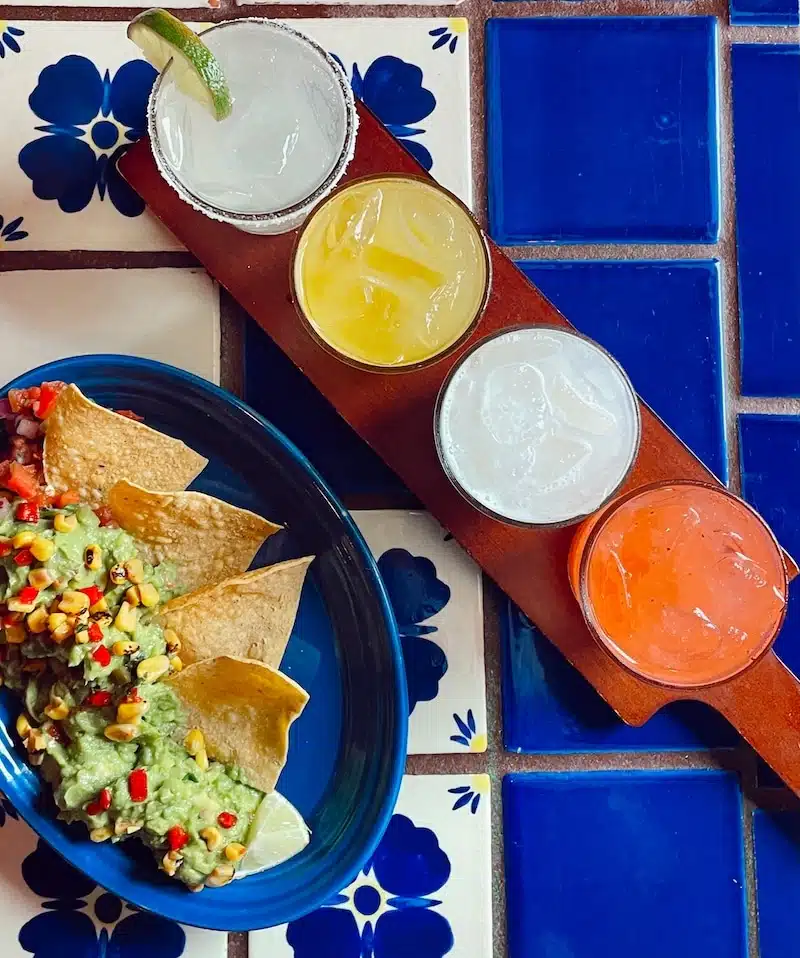
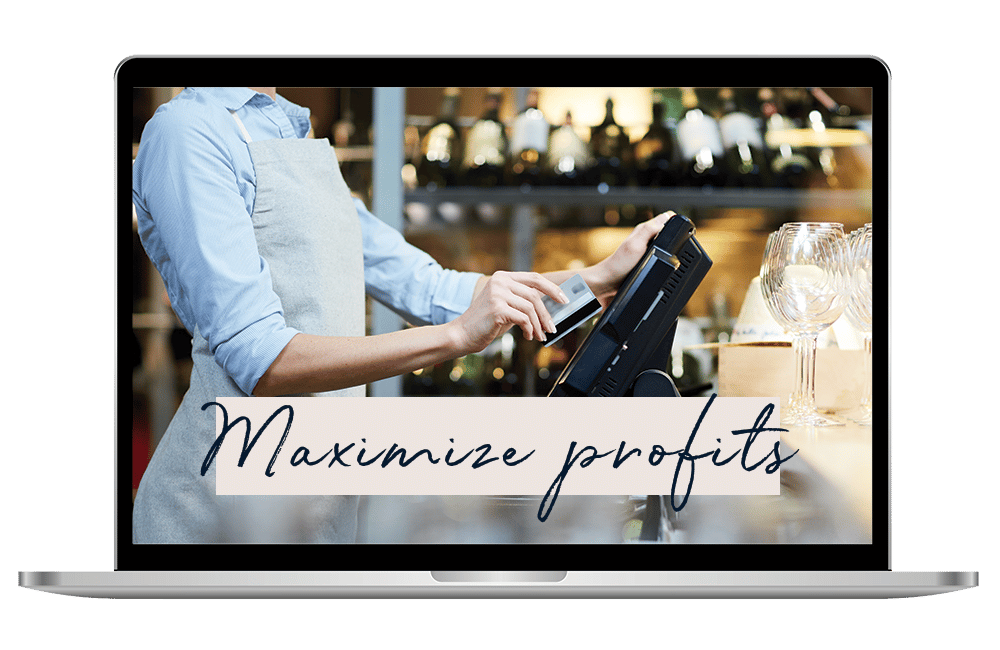
The three costly mistakes you could unknowingly be making?
Find out in this FREE guide and restaurant assessment specifically designed to reveal the unexpected hurdles standing between you and exponential business growth.
Thank You To Our Sponsors

Automate Your Sales Tax. Why Not Try Davo FREE for 30 Days.
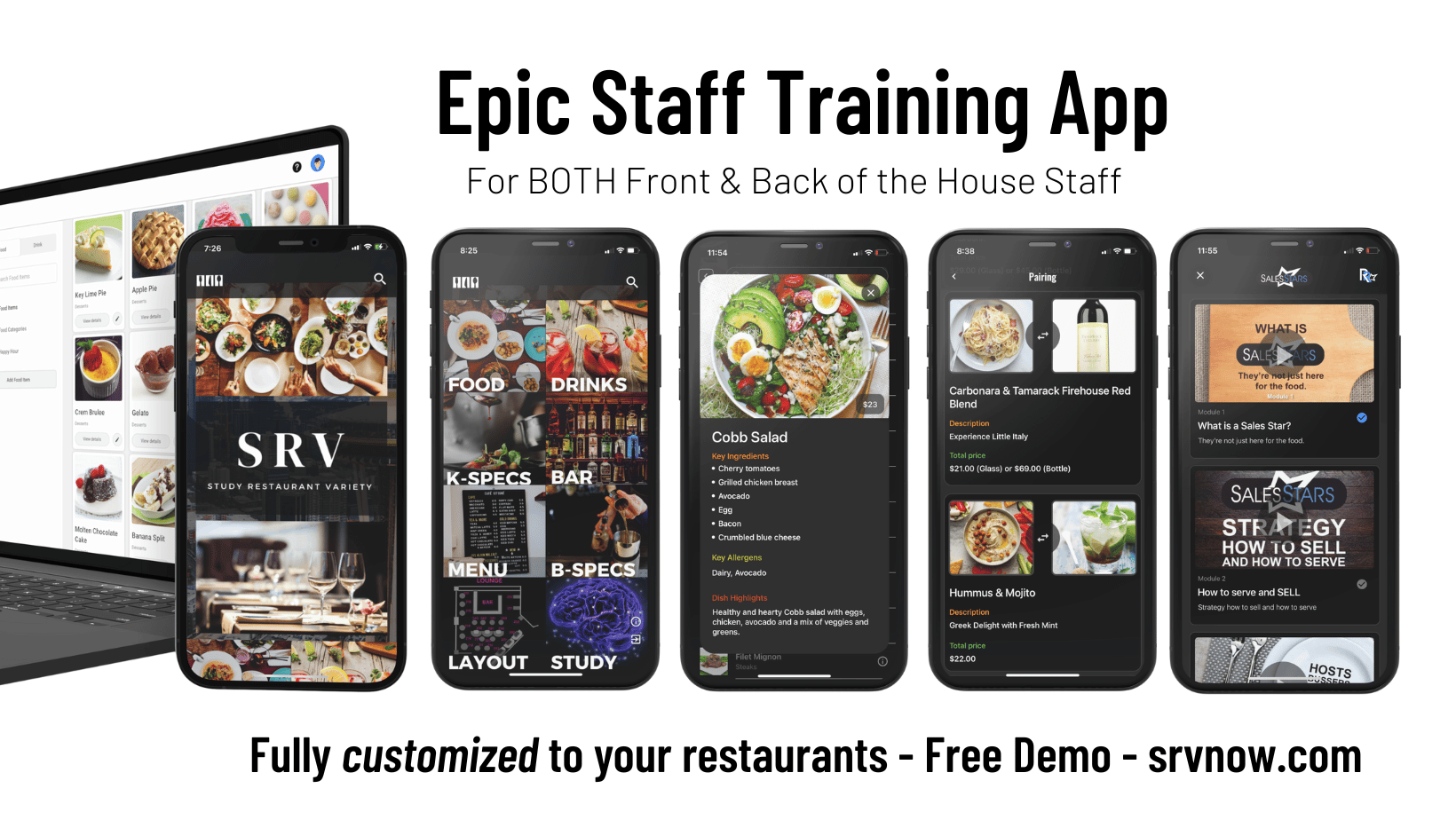
SRV teaches your team to profitably sell and accurately create the food and drinks at your restaurant.
Unlock Staff Potential and Maximize Sales
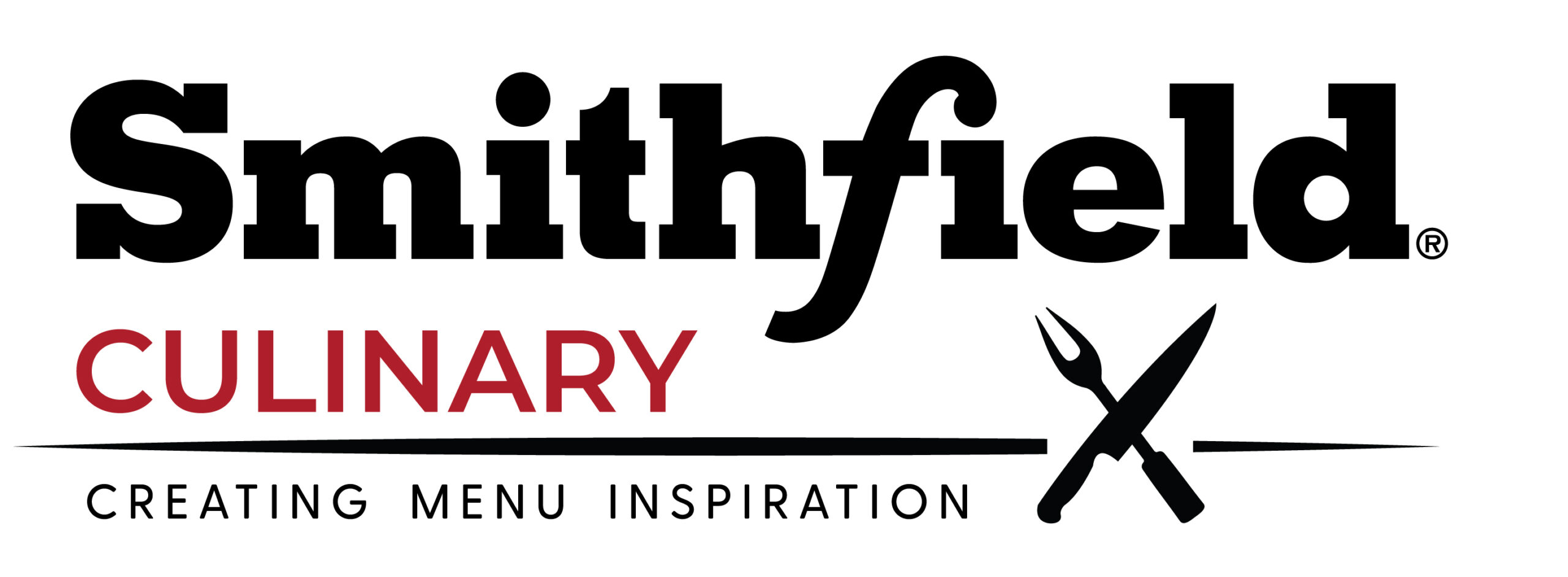
Inspiring Head-Turning Menu Creativity
Culinary Trends & Chef Inspired Recipes - Learn More

Simplify and automate your accounts payable. Process, approve, and pay all of your company’s spend from anywhere - Request a Demo
Want to become a podcast sponsor?
Please get in touch with Roger at roger@restaurantrockstars.com
